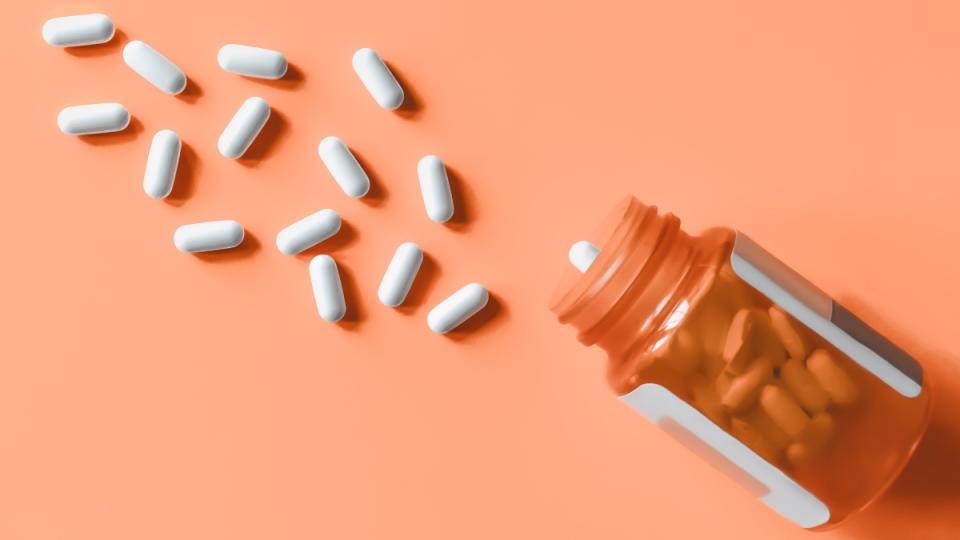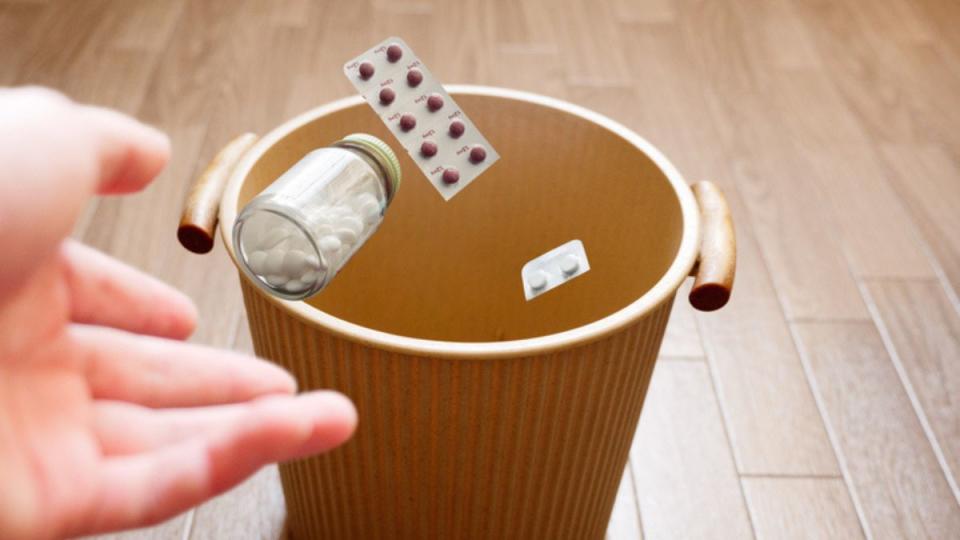Is Expired Medication Safe To Use? Pharmacists Reveal When Good Meds Go Bad
- Oops!Something went wrong.Please try again later.
Ever rummaged through your medicine cabinet for relief from a throbbing headache, only to find that your go-to painkiller has past its “use by” date? Now you're left with a dilemma: Do you take the meds anyway (and what happens if you do?), or is it better to toss them out? We asked pharmacists how long you can really use expired medication safely, plus the best ways to store your meds to maximize their shelf life.
Expired medication: What do those dates actually mean?
Turns out the expiration date on your medication isn't a hard and fast rule about its usability. It speaks more about the data from the manufacturer when it was approved, says Kate Naper, PharmD, Clinical Manager of UNC Hospitals Outpatient Pharmacy and Transitions of Care.
"Manufacturers must provide evidence of their product’s stability, purity, potency and efficacy under proper storage conditions to gain FDA approval,” says Naper. “There are actual clinical studies determining how long a product can maintain these standards before market approval."
James Reissig, PharmD, with University Hospitals in Ohio, points out that determining expiration dates also involves practical considerations. Drug manufacturers often choose a conservative expiration date (usually two to three years out) because they can’t test a drug’s effectiveness indefinitely.
“Many drugs could potentially be stable for longer, but at some point, the manufacturer has to start selling the product,” he explains. “They set an expiration date based on the period they can guarantee the medication will remain as potent as when first manufactured, within a certain percentage.”
In fact, a study in the Archives of Internal Medicine found that many drugs keep potency an eye-raising 40 years past expiration. And 86% of the tested drugs retained at least 90% of their labeled potency under ideal storage conditions.

Is it safe to take expired medication?
Although the FDA advises against using expired medication, the reality isn't so cut-and-dry. When it comes to common over-the-counter remedies, “most of these tablets are likely stable for a significant time beyond their expiration dates,” Reissig says. “If you have a migraine and your medication bottle is three months expired, that's perfectly safe to take.”
While such medications may remain safe past their expiration, their effectiveness might not be what it once was. Many drugs, if stored correctly, retain about 90% of their potency for at least five years beyond their expiration date — and sometimes much longer.
Related: How To Know If Expired Hand Sanitizer Is Still Good + What *Never* To Do With It
Your guide to using expired medication
Here's how long our experts say you can safely use OTC expired medication.
1. Pain relievers
Painkillers and fever reducers (like Advil, Tylenol and Aleve) can generally be used for 6 months past their expiration date, according to Hedva Barenholtz Levy, PharmD, senior care specialist and author of Maybe It’s Your Medications. “It is likely okay through 12 months — or even longer — as long as it’s been properly stored. But because of the variability once a product is in a person’s home, it is safest to simply discard an OTC product if it is 6-12 months beyond the expiration date,” Levy says.

Tip: Pain meds slightly past their prime? Taking them with a cup of coffee boosts pain relief by 40%, say to NYU scientists. Caffeine speeds the medicine into your bloodstream while acting as a mild analgesic.
2. Cough medicine
Whether you’re reaching for a suppressant to quell a pesky cough or an expectorant to clear congested lungs, Levy says your cough medicine should be good for roughly 6 months after its expiration date in pill form. “Liquid products are less stable than solid dosage forms, such as tablets and capsules,” she explains. Since cough syrups are liquid and therefore less stable, you’re better off replacing them once they’ve expired.
See also: Skip the Cough Suppressants — Pairing Honey With Lemon Offers More Effective Relief
3. Allergy medicine
There's good news for seasonal allergy sufferers who may only use these meds for a brief time every year. Antihistamines (including Zyrtec, Claritin, Allegra and Benadryl) still work to stop sniffles, sneezes, watery eyes and other allergy symptoms for about 6 months after they “expire” as long as they’re in pill form and not liquid, according to Levy. (Here's how to tell if your cold is actually allergies.)
4. Laxatives
When you’re in need of a laxative, you want one that works. Will the expired bottle of Dulcolax or Colace in your cabinet still do the trick? It will if it’s a tablet or capsule and you’re using it within around 6 months of the expiration date, Levy says. Liquid medicines like Milk of Magnesia, on the other hand, should be avoided once expired.
What happens if you take expired medication?
Very few medications become toxic after their expiration dates, and the majority are unlikely to cause harm. However, their effectiveness could decrease over time, says Reissig. For example, a 10 mg medication might function like a 7 mg dose after its expiration.
This diminished potency might be inconsequential for OTC meds. But the implications could be significant for prescription medication requiring precise dosing, such as blood thinners, epinephrine pens, inhalers, insulin, nitroglycerine tablets, seizure medications and thyroid medications, he adds.

And although currently only the antibiotic tetracycline is known to be harmful when expired, there are other considerations. “Always complete the full course of an antibiotic," Reissig advises. "If you feel better and stop taking them prematurely, you might be tempted to use the leftovers for a future illness they are no longer effective against. And that can cause more problems.”
Additionally, medications that require refrigeration may degrade faster if not stored correctly, Naper says. “Injectable solutions should be discarded if they become cloudy, discolored or form a precipitate. Outdated preservatives may fail to prevent bacterial growth effectively."
Another time it's important to stick to the expiration date? When to comes to products you’re using on or near your eyes. “Absolutely discard any eye medications past their expiration date, and ensure cleanliness when handling such products," she adds.
While you should be more strict with prescription medication expiration dates, there's room for leniency with maintenance medications such as those for cholesterol. “These may not retain the same potency as when first manufactured, but they’re unlikely to be harmful,” Reissig says. “Using them as a bridge until you get a new prescription is generally safe.”
How to store medication to maximize shelf life
You should always follow the storage directions on your medication label. Usually, that'll be a cool, dry and secure place that’s kid- and animal-proof.
"A lot of people store medications in a bathroom,” Reissig says. “If you ever get out of the shower and you see fog in the air, that's a good indication that it's not a great place to store your medications."
Humidity can make medications degrade faster. “There's a chance there can actually be changes in the chemical composition,” Naper reveals. “It might be less potent and, in some cases, it could even be susceptible to bacterial growth and contamination.”
Medications that are sensitive to light often come in protective packaging to minimize exposure. However, Reissig advises against complacency. "Don't leave them sitting out on your sunny kitchen counter, especially those that come in unit-dose packaging like blister packs within a small cardboard box," he says.
Certain medications require refrigeration to retain their potency. "If it's labeled to be stored in the refrigerator, you definitely want to follow that guideline," Reissig says. Medications like insulin or certain antibiotics can lose their effectiveness quickly if not stored at the correct temperature.
How to dispose of expired medication

Here's how to safely get rid of expired medication.
1. Use medication take-back programs
Many local communities hold National Prescription Drug Take Back Days in April and October, providing safe places to dispose of unwanted medications.
2. Visit pharmacy disposal kiosks
Pharmacies often have kiosks that accept prescription drugs, OTC medications and even liquid medication bottles. You can also find DEA-authorized collectors in your community through local law enforcement or the DEA website. Additionally, many pharmacies provide at-home medication disposal packets, such as DisposeRX. When these are mixed with the medication and water, they dissolve active ingredients and make them unusable.
3. Mix meds with kitty litter
"If you're unable to access a disposal kiosk or event, you can mix medications with unappealing substances like kitty litter or old coffee grounds," says Naper. This mixture should be placed in a sealed baggie before being thrown away, ensuring it's not easily retrievable, she says.
4. Flush only in this case
Flushing medications is typically discouraged because it can lead to environmental contamination. However, in cases involving frequently abused or misused substances like opioids (for example, oxycodone, hydrocodone or fentanyl), the FDA recommends flushing to prevent accidental ingestion or misuse.
“In cases where medications pose a significant risk of misuse, such as certain opioids, flushing is recommended if take-back programs aren't available,” says Naper. "For a small set of medications, the risk of harm to people from inappropriate or accidental exposure may be greater than the risks to people and the environment when flushed.”
Discover our best health-boosting supplements:
Anxious and On-Edge? Doctors Share the Best Supplements to Tame Stress Naturally
Astaxanthin Is the Deep Sea Supplement Experts Say Improves Longevity + Benefits Heart and Vision
This content is not a substitute for professional medical advice or diagnosis. Always consult your physician before pursuing any treatment plan.

